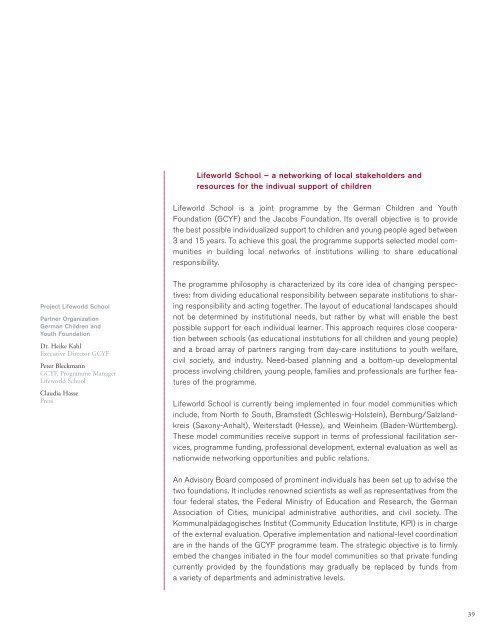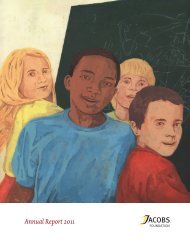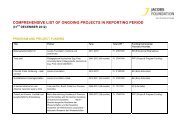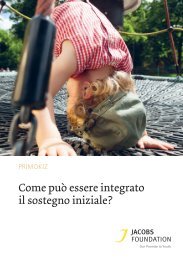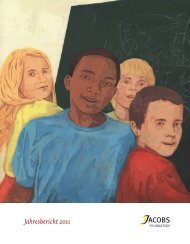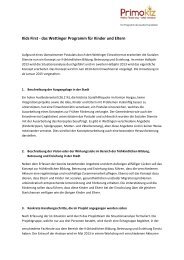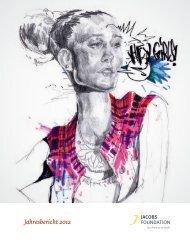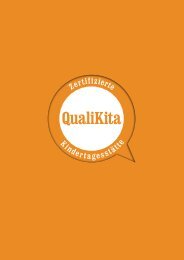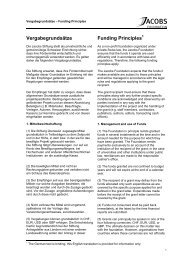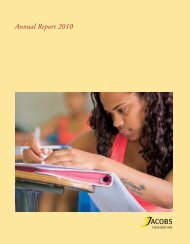Annual Report 2008 - Jacobs Foundation
Annual Report 2008 - Jacobs Foundation
Annual Report 2008 - Jacobs Foundation
Create successful ePaper yourself
Turn your PDF publications into a flip-book with our unique Google optimized e-Paper software.
Project Lifeworld School<br />
Partner Organization<br />
German Children and<br />
Youth <strong>Foundation</strong><br />
Dr. Heike Kahl<br />
Executive Director GCYF<br />
Peter Bleckmann<br />
GCYF, Programme Manager<br />
Lifeworld School<br />
Claudia Hasse<br />
Press<br />
Lifeworld School – a networking of local stakeholders and<br />
resources for the indivual support of children<br />
Lifeworld School is a joint programme by the German Children and Youth<br />
<strong>Foundation</strong> (GCYF) and the <strong>Jacobs</strong> <strong>Foundation</strong>. Its overall objective is to provide<br />
the best possible individualized support to children and young people aged between<br />
3 and 15 years. To achieve this goal, the programme supports selected model communities<br />
in building local networks of institutions willing to share educational<br />
responsibility.<br />
The programme philosophy is characterized by its core idea of changing perspectives:<br />
from dividing educational responsibility between separate institutions to sharing<br />
responsibility and acting together. The layout of educational landscapes should<br />
not be determined by institutional needs, but rather by what will enable the best<br />
possible support for each individual learner. This approach requires close cooperation<br />
between schools (as educational institutions for all children and young people)<br />
and a broad array of partners ranging from day-care institutions to youth welfare,<br />
civil society, and industry. Need-based planning and a bottom-up developmental<br />
process involving children, young people, families and professionals are further features<br />
of the programme.<br />
Lifeworld School is currently being implemented in four model communities which<br />
include, from North to South, Bramstedt (Schleswig-Holstein), Bernburg/Salzlandkreis<br />
(Saxony-Anhalt), Weiterstadt (Hesse), and Weinheim (Baden-Württemberg).<br />
These model communities receive support in terms of professional facilitation services,<br />
programme funding, professional development, external evaluation as well as<br />
nationwide networking opportunities and public relations.<br />
An Advisory Board composed of prominent individuals has been set up to advise the<br />
two foundations. It includes renowned scientists as well as representatives from the<br />
four federal states, the Federal Ministry of Education and Research, the German<br />
Association of Cities, municipal administrative authorities, and civil society. The<br />
Kommunalpädagogisches Institut (Community Education Institute, KPI) is in charge<br />
of the external evaluation. Operative implementation and national-level coordination<br />
are in the hands of the GCYF programme team. The strategic objective is to firmly<br />
embed the changes initiated in the four model communities so that private funding<br />
currently provided by the foundations may gradually be replaced by funds from<br />
a variety of departments and administrative levels.<br />
39


